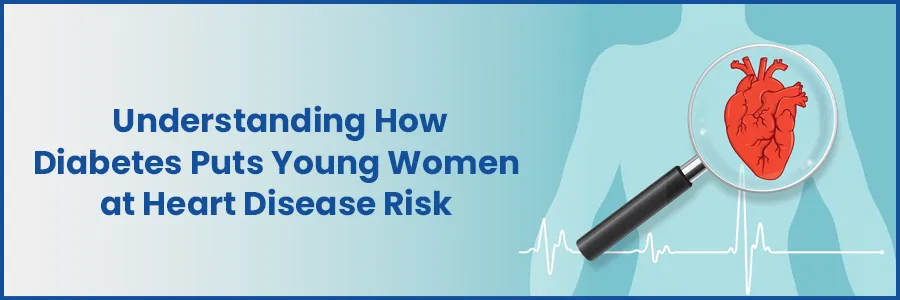- Cardiology 84
- Dermatology 45
- Endocrinology 33
- ENT 16
- Fertility 190
- Gastroenterology 78
- General-Medicine 81
- Gynecology 80
- Hematology 19
- Infectious-Diseases 33
- Neurology 52
- Oncology 34
- Ophthalmology 23
- Orthopedics 69
- Pediatrics 31
- Procedure 23
- Public-Health 144
- Pulmonology 59
- Radiology 8
- Urology 68
- Wellness 161
- Woman-and-child 77

Understanding the Link Between Diabetes and Heart Disease
Diabetes and heart disease are two interconnected health concerns that often coexist, significantly impacting one's overall health and well-being. The relationship between diabetes and heart disease is profound, with diabetes being recognized as a major risk factor for developing cardiovascular complications, including heart disease and stroke.
Diabetes and Heart Disease Risk:
The risk of heart disease in individuals with diabetes is notably higher compared to those without diabetes. This heightened risk stems from various factors, including elevated blood glucose levels, which can damage blood vessels and nerves over time.
Additionally, individuals with diabetes often have other conditions that contribute to heart disease risk, such as high blood pressure and abnormal cholesterol levels.
Relationship Between Diabetes and Heart Disease:
The relationship between diabetes and heart disease is multifaceted. Diabetes contributes to heart disease through several mechanisms, including:
- Insulin Resistance: In type 2 diabetes, the body becomes resistant to insulin's effects, leading to elevated blood sugar levels. Insulin resistance is associated with an increased risk of cardiovascular disease.
- Blood Vessel Damage: High blood sugar levels can damage the lining of blood vessels, making them more prone to atherosclerosis and narrowing. This process restricts blood flow to the heart and other organs, increasing the risk of heart attack and stroke.
- Inflammation: Diabetes is linked to chronic inflammation throughout the body, which plays a role in the development and progression of cardiovascular diseases.
Diabetes, Heart Disease, and Stroke:
Moreover, diabetes is closely associated with an increased risk of stroke, another severe consequence of cardiovascular disease. The combination of high blood glucose levels and other risk factors contributes to the formation of blood clots or the narrowing of arteries in the brain, leading to a stroke.
Diabetes and Heart Disease Connection:
The connection between diabetes and heart disease lies in their shared risk factors and underlying mechanisms. Insulin resistance, a hallmark of type 2 diabetes, is linked to inflammation and oxidative stress, which can damage the walls of blood vessels and promote atherosclerosis (hardening of the arteries). This process accelerates the development of cardiovascular complications.
Risk Factors of Heart Disease in Young Women:
It's essential to note that heart disease doesn't discriminate by age or gender. Young women with diabetes face unique challenges, as they may be less aware of their risk factors or symptoms compared to older adults.
Factors such as obesity, sedentary lifestyle, and family history of heart disease amplify their risk, underscoring the importance of early detection and preventive measures.
Conclusion:
In conclusion, the relationship between diabetes and heart disease is undeniable, with diabetes serving as a significant risk factor for cardiovascular complications including heart disease and stroke.
Understanding this connection empowers individuals to manage their diabetes effectively through lifestyle modifications, medication adherence, and regular medical check-ups. By proactively addressing both diabetes management and heart health, individuals can reduce their risk and improve their overall quality of life.
Ready to take control of your health journey? Book your appointment now and start your path towards wellness today!
Book an AppointmentFrequently Asked Questions
Diabetes causes high blood sugar levels that damage blood vessels, leading to narrowed arteries (atherosclerosis) and increased risk of heart disease in young women.
Both young women and men with diabetes face increased heart disease risk. Unique hormonal and metabolic factors in women may also contribute.
Yes, taking medication, eating a healthy diet, exercising regularly, and making lifestyle changes can help lower heart disease risk for people with diabetes.
Symptoms may include chest pain, shortness of breath, fatigue, dizziness, jaw pain, or nausea. Consulting a doctor for any unusual symptoms is important.
Yes, whether it's type 1 or type 2 diabetes, effective diabetes management is crucial for reducing the risk of heart disease.
Managing diabetes well is a significant step, but other factors like family history and lifestyle choices also influence heart disease risk.
Hormonal changes during menstruation, pregnancy, and menopause can affect blood sugar levels and impact heart disease risk factors.
Pregnancy can strain the heart, especially for women with diabetes. Proper prenatal care and diabetes management are important.
Yes, having a family history of heart disease increases overall risk. Knowing your family's medical history helps in taking preventive measures.

- Cardiology 2132
- Dermatology 168
- Endocrinology 135
- ENT 97
- Fertility 217
- Gastroenterology 232
- General 478
- General-Medicine 1685
- Gynecology 169
- Hematology 85
- Infectious-Diseases 208
- Neurology 207
- Oncology 345
- Ophthalmology 65
- Orthopedics 187
- Pediatrics 83
- Procedure 72
- Public-Health 209
- Pulmonology 126
- Radiology 13
- Second Opinion 311
- Urology 294
- Wellness 600
- Woman-and-child 447
Related Blogs
If you have any questions, please fill out the enquiry form or call us, and we will get back to you promptly.
040-68334455